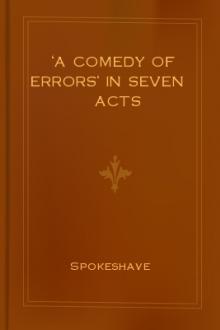Tales of St. Austin's by P. G. Wodehouse (debian ebook reader TXT) 📗

- Author: P. G. Wodehouse
Book online «Tales of St. Austin's by P. G. Wodehouse (debian ebook reader TXT) 📗». Author P. G. Wodehouse
Mr Seymour shook hands, without appearing to recognize him. Babington's blood began to resume its normal position again, though he felt that this seeming ignorance of his identity might be a mere veneer, a wile of guile, as the bard puts it. He remembered, with a pang, a story in some magazine where a prisoner was subjected to what the light-hearted inquisitors called the torture of hope. He was allowed to escape from prison, and pass guards and sentries apparently without their noticing him. Then, just as he stepped into the open air, the chief inquisitor tapped him gently on the shoulder, and, more in sorrow than in anger, reminded him that it was customary for condemned men to remain inside their cells. Surely this was a similar case. But then the thought came to him that Mr Seymour had only seen him once, and so might possibly have failed to remember him, for there was nothing special about Babington's features that arrested the eye, and stamped them on the brain for all time. He was rather ordinary than otherwise to look at. At tea, as bad luck would have it, the two sat opposite one another, and Babington trembled. Then the worst happened. Mr Seymour, who had been looking attentively at him for some time, leaned forward and said in a tone evidently devoid of suspicion: 'Haven't we met before somewhere? I seem to remember your face.'
'Er—no, no,' replied Babington. 'That is, I think not. We may have.'
'I feel sure we have. What school are you at?'
Babington's soul began to writhe convulsively.
'What, what school? Oh, what school? Why, er—I'm at—er—Uppingham.'
Mr Seymour's face assumed a pleased expression.
'Uppingham? Really. Why, I know several Uppingham fellows. Do you know Mr Morton? He's a master at Uppingham, and a great friend of mine.'
The room began to dance briskly before Babington's eyes, but he clutched at a straw, or what he thought was a straw.
'Uppingham? Did I say Uppingham? Of course, I mean Rugby, you know, Rugby. One's always mixing the two up, you know. Isn't one?'
Mr Seymour looked at him in amazement. Then he looked at the others as if to ask which of the two was going mad, he or the youth opposite him. Babington's cousin listened to the wild fictions which issued from his lips in equal amazement. He thought he must be ill. Even Richards had a fleeting impression that it was a little odd that a fellow should forget what school he was at, and mistake the name Rugby for that of Uppingham, or vice versa. Babington became an object of interest.
'I say, Jack,' said the cousin, 'you're feeling all right, aren't you? I mean, you don't seem to know what you're talking about. If you're going to be ill, say so, and I'll prescribe for you.'
'Is he at Rugby?' asked Mr Seymour.
'No, of course he's not. How could he have got from Rugby to London in time for a morning performance? Why, he's at St Austin's.'
Mr Seymour sat for a moment in silence, taking this in. Then he chuckled. 'It's all right,' he said, 'he's not ill. We have met before, but under such painful circumstances that Master Babington very thoughtfully dissembled, in order not to remind me of them.'
He gave a brief synopsis of what had occurred. The audience, exclusive of Babington, roared with laughter.
'I suppose,' said the cousin, 'you won't prosecute, will you? It's really such shocking luck, you know, that you ought to forget you're a master.'
Mr Seymour stirred his tea and added another lump of sugar very carefully before replying. Babington watched him in silence, and wished that he would settle the matter quickly, one way or the other.
'Fortunately for Babington,' said Mr Seymour, 'and unfortunately for the cause of morality, I am not a master. I was only a stop-gap, and my term of office ceased today at one o'clock. Thus the prisoner at the bar gets off on a technical point of law, and I trust it will be a lesson to him. I suppose you had the sense to do the imposition?'
'Yes, sir, I sat up last night.'
'Good. Now, if you'll take my advice, you'll reform, or another day you'll come to a bad end. By the way, how did you manage about roll-call today?'
'I thought that was an awfully good part just at the end of the first act,' said Babington.
Mr Seymour smiled. Possibly from gratification.
'Well, how did it go off?' asked Peterson that night.
'Don't, old chap,' said Babington, faintly.
'I told you so,' said Jenkins at a venture.
But when he had heard the whole story he withdrew the remark, and commented on the wholly undeserved good luck some people seemed to enjoy.
11 — 'THE TABBY TERROR'
The struggle between Prater's cat and Prater's cat's conscience was short, and ended in the hollowest of victories for the former. The conscience really had no sort of chance from the beginning. It was weak by nature and flabby from long want of exercise, while the cat was in excellent training, and was, moreover, backed up by a strong temptation. It pocketed the stakes, which consisted of most of the contents of a tin of sardines, and left unostentatiously by the window. When Smith came in after football, and found the remains, he was surprised, and even pained. When Montgomery entered soon afterwards, he questioned him on the subject.
'I say, have you been having a sort of preliminary canter with the banquet?'
'No,' said Montgomery. 'Why?'
'Somebody has,' said Smith, exhibiting the empty tin. 'Doesn't seem to have had such a bad appetite, either.'
'This reminds me of the story of the great bear, the medium bear, and the little ditto,' observed Montgomery, who was apt at an analogy. 'You may remember that when the great bear found his porridge tampered with, he—'
At this point Shawyer entered. He had been bidden to the feast, and was feeling ready for it.
'Hullo, tea ready?' he asked.
Smith displayed the sardine tin in much the same manner as the conjurer shows a pack of cards when he entreats you to choose one, and remember the number.
'You haven't finished already, surely? Why, it's only just five.'
'We haven't even begun,' said Smith. 'That's just the difficulty. The





Comments (0)